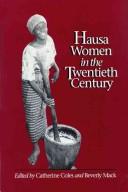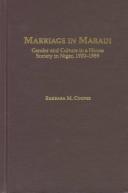| Listing 1 - 5 of 5 |
Sort by
|

ISBN: 0299130231 9780299130237 0299130207 9780299130206 029913024X 9780299130244 Year: 1991 Publisher: Madison, Wis. University of Wisconsin Press
Abstract | Keywords | Export | Availability | Bookmark
 Loading...
Loading...Choose an application
- Reference Manager
- EndNote
- RefWorks (Direct export to RefWorks)
The Hausa are one of the largest ethnic groups in Africa, with populations in Nigeria, Niger, and Ghana. Their long history of city-states and Islamic caliphates, their complex trading economies, and their cultural traditions have attracted the attention of historians, political economists, linguists, and anthropologists. The large body of scholarship on Hausa society, however, has assumed the subordination of women to men. Hausa Women in the Twentieth Century refutes the notion that Hausa women are pawns in a patriarchal Muslim society. The contributors, all of whom have done field research in Hausaland, explore the ways Hausa women have balanced the demands of Islamic expectations and Western choices as their society moved from a precolonial system through British colonial administration to inclusion in the modern Nigerian nation. This volume examines the roles of a wide variety of women, from wives and workers to political activists and mythical figures, and it emphasizes that women have been educators and spiritual leaders in Hausa society since precolonial times. From royalty to slaves and concubines, in traditional Hausa cities and in newer towns, from the urban poor to the newly educated elite, the "invisible women" whose lives are documented here demonstrate that standard accounts of Hausa society must be revised. Scholars of Hausa and neighboring West African societies will find in this collection a wealth of new material and a model of how research on women can be integrated with general accounts of Hausa social, religious, political, and economic life. For students and scholars looking at gender and women's roles cross-culturally, this volume provides an invaluable African perspective.--Publisher description

ISBN: 029913024X Year: 1991 Publisher: Madison (Wis.): University of Wisconsin press
Abstract | Keywords | Export | Availability | Bookmark
 Loading...
Loading...Choose an application
- Reference Manager
- EndNote
- RefWorks (Direct export to RefWorks)
Muslim women.
---
Women, Hausa.
---
#BIBC:ruil
Book
ISBN: 9188614581 Year: 2006 Publisher: Göteborg Göteborg university. Department of history
Abstract | Keywords | Export | Availability | Bookmark
 Loading...
Loading...Choose an application
- Reference Manager
- EndNote
- RefWorks (Direct export to RefWorks)
Citizenship --- Islam and civil society --- Muslim women --- Women, Hausa --- Civil rights --- Nigeria --- History --- Social conditions.
Book
ISBN: 9780253023834 9780253023759 9780253023896 0253023890 0253023750 0253023831 Year: 2017 Publisher: Bloomington, Indiana ; Indianapolis, Indiana : Indiana University Press,
Abstract | Keywords | Export | Availability | Bookmark
 Loading...
Loading...Choose an application
- Reference Manager
- EndNote
- RefWorks (Direct export to RefWorks)
As she tells Hadija's story, O'Rourke disrupts dominant patriarchal and colonial narratives that have emphasized male activities and projects to assert cultural distinctiveness, and she brings forward a new set of women's issues involving concerns for personal prosperity, the continuation of generations, and Islamic religious expectations in communities separated by long distances.
Hausa (African people) --- Women, Hausa --- Marriage customs and rites --- Islamic marriage customs and rites --- Marriage customs and rites. --- Social conditions. --- Marriage customs and rites, Islamic --- Muslim marriage customs and rites --- Bridal customs --- Betrothal --- Manners and customs --- Rites and ceremonies --- Weddings --- Hausa women --- Women, Hausa (African people) --- Abakwariga (African people) --- Afuno (African people) --- Haoussa (African people) --- Hausaawaa (African people) --- Hausas --- Hausawa (African people) --- Haussa (African people) --- Hawsa (African people) --- Mgbakpa (African people) --- Ethnology

ISBN: 0435074148 043507413X 0852556772 0852556276 9780435074135 Year: 1997 Publisher: Portsmouth, NH : Oxford : Heinemann ; J. Currey,
Abstract | Keywords | Export | Availability | Bookmark
 Loading...
Loading...Choose an application
- Reference Manager
- EndNote
- RefWorks (Direct export to RefWorks)
Hausa (African people) --- Women, Hausa --- Sex role --- Marriage customs and rites --- Haoussa (Peuple d'Afrique) --- Hausa (Peuple d'Afrique) --- Femmes haoussa --- Rôle selon le sexe --- Mariage --- Marriage customs and rites. --- Kinship. --- Social conditions. --- Economic conditions. --- History. --- Rites et cérémonies --- Parenté --- Conditions économiques --- Histoire --- Maradi (Niger) --- Conditions sociales --- Brauchtum. --- Ehe. --- Haoussa (peuple d'Afrique) --- Hausa (volk). --- Hausa. --- Hochzeit. --- Huwelijk. --- Conditions sociales. --- Conditions économiques. --- Parenté. --- Rites et cérémonies du mariage. --- Maradi --- History --- Niger. --- Rôle selon le sexe --- Rites et cérémonies --- Parenté --- Conditions économiques
| Listing 1 - 5 of 5 |
Sort by
|

 Search
Search Feedback
Feedback About UniCat
About UniCat  Help
Help News
News